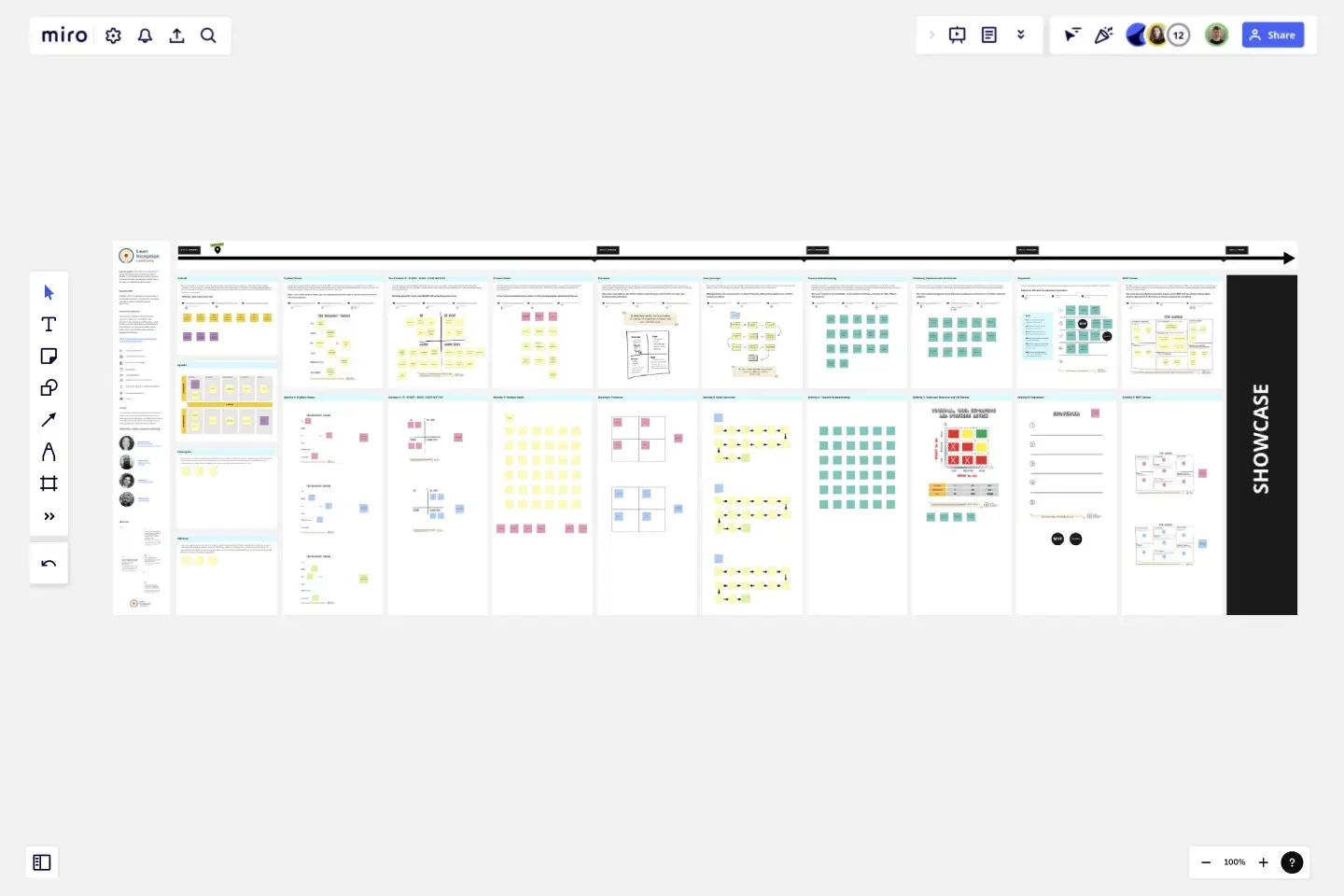Lean Inception Workshop
The Lean Inception workshop template offers a comprehensive series of activities, typically scheduled over the course of a week that helps teams understand, align and plan the building of the MVP – Minimum Viable Product – and the product increments.
When to use The Lean Inception template?
As a product leader or facilitator, you want to align the different perspectives – business, User eXperience and technical – to achieve best product development possible right now.The Lean Inception workshop is highly recommended in two main circumstances.
Large projects find a lean inception valuable to start quickly and be oriented to work in a lean style. Such a start builds early iterations designed to discover and test what features are truly valued by their users.
Smaller organizations (such as startups) use lean inceptions to take an idea that's been tested by some pre-software MVPs and evolve it into a software product.
This workshop is specifically about understanding an MVP, it doesn't substitute for ideation sessions, customer research, architectural review, or competitive analysis. It's one specific technique that's part of understanding what it takes to build a successful product.
How does The Lean Inception template work?
You’ll be guided through a 5-day workshop with a comprehensive step-by-step instruction and facilitation tips for each activity:
Day 1: Kick-off; Product Vision; Is- Is Not – Does – Does not do; Product Goals.
Day 2: Personas; User journeys.
Day 3: Features Brainstorming; Business, UX and Technical Review.
Day 4: Journeys and Feature; Sequencer
Day 5: MVP Canvas; Showcase.
This template was created by Paulo Caroli.
Get started with this template right now.
Product Discovery Kick Off Workshop
Works best for:
Product Managament, Planning
The Product Discovery Kick Off Workshop template accelerates the start of product discovery initiatives. By facilitating collaborative workshops, defining objectives, and establishing timelines, this template ensures that product discovery efforts are structured and focused. With sections for defining user personas, articulating problem statements, and setting success criteria, it guides teams through the initial stages of product discovery, laying the foundation for successful product development. This template serves as a catalyst for aligning teams and kick-starting product innovation journeys.
Product / Market Fit Canvas Template
Works best for:
Market Research, Strategic Planning, Product Management
The product/market fit canvas template is used to help product teams meet customer and market needs with their product design. This template looks at a product in two dimensions: first, how the product fits user needs, and second, how the fully designed product fits within the market landscape. This combined metric understands a product holistically from the way customers use and desire a product, to the market demand. By comparing customer and product qualities side by side, users should better understand their product space and key metrics.
Azure Data Flow Template
Works best for:
Software Development, Diagrams
The Azure Data Flow is a diagram that will allow you to combine data and build and deploy custom machine learning models at scale. Azure is Microsoft’s cloud computing platform, designed to provide many cloud-based services like remote storage, database hosting, and centralized account management. Azure also offers new capabilities like AI and the Internet of Things (IoT).
Cross Functional Flowchart
Works best for:
Org Charts, Business Management
Have a quick look at everyone on a project and see exactly what they’ll contribute. That’s the clarity and transparency a cross-functional flowchart will give you. These are also called “swim lane” flowcharts because each person (each customer, client, or representative from a specific function) is assigned a lane—a clear line—that will help you visualize their roles at each stage of the project. This template will empower you to streamline processes, reduce inefficiencies, and make meaningful cross-functional relationships.
Epic & Feature Roadmap Planning
Epic & Feature Roadmap Planning template facilitates the breakdown of large-scale initiatives into manageable features and tasks. It helps teams prioritize development efforts based on business impact and strategic objectives. By visualizing the relationship between epics and features, teams can effectively plan releases and ensure alignment with overall project goals and timelines.
Taco Tuesday Retrospective
Works best for:
Agile Methodology, Retrospectives, Meetings
The Taco Tuesday Retrospective template offers a fun and informal approach to retrospectives, perfect for fostering team camaraderie. It provides elements for reflecting on past iterations over a casual taco-themed gathering. This template enables teams to relax, share insights, and brainstorm ideas in a laid-back atmosphere. By promoting social interaction and creativity, the Taco Tuesday Retrospective empowers teams to strengthen relationships, boost morale, and drive continuous improvement effectively.
